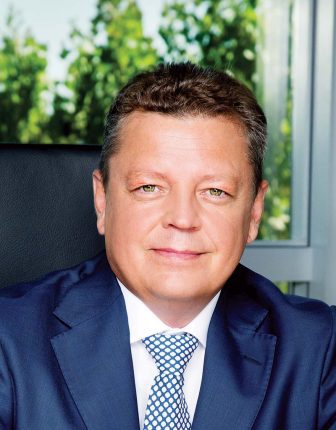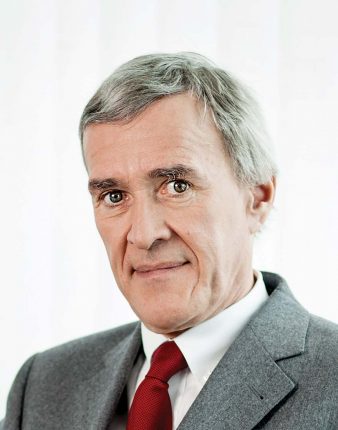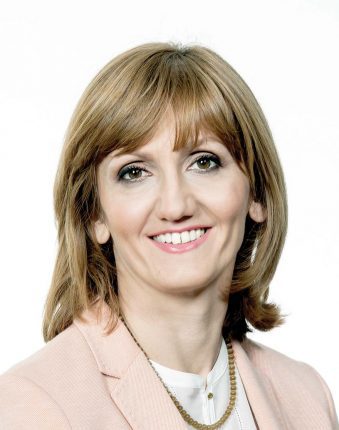Serbia has the potential to grab some global trends when it comes to digitisation, modern agriculture and energy efficiency, becoming a regional leader in air traffic and refraining from counterproductive banking choices
In this Focus, we asked general managers of leading companies and banks about the issues that correspond to major global trends and are also reflected in the local Serbian market. We asked bankers whether Serbian banks will follow the trend of their counterparts elsewhere in the world by introducing negative interest rates on savings, and how far we can go with the digitisation of the services banks offer clients.
In addition, we asked some of the most prominent industry leaders to tell us about Serbia’s prospects for agriculture, air traffic and energy efficiency, through the lens of their everyday experiences of the global and local markets.
The answers we received may well serve both their counterparts in the Serbian economy and the broadest public.

TOPIC: NEGATIVE INTEREST RATES & CITIZENS’ SAVINGS
Not an Option for Serbia
Although banks in certain countries have decided to introduce negative interest rates, taking into consideration the conditions on the domestic market, that is not a realistic scenario for Serbia
Introducing negative interest rates to the Serbian financial market would most probably cause a decrease in the overall interest in savings, which is not our goal. Our clients expect a return on their investment, at least enough to counter inflationary effects. Accepting and paying interest on client deposits is a basic banking principle and, as a traditional bank, we feel obliged to continue this tradition. With good planning, these funds can always be disbursed back to clients in a profitable manner through short-term financing.
Accepting and paying interest on client deposits is a basic banking principle and, as a traditional bank, we feel obliged to continue this tradition
When talking about the banks in countries that have decided to adopt the negative interest-rate strategy, we will see what kind of outcome these negative interest rates will have on the global economy. It has not only been introduced by European countries like Denmark, Switzerland and Sweden but recently also Japan, while the U.S. Federal Reserve System is about to stress-test a case scenario in which the interest rate on the three-month U.S. Treasury bill will be negative in Q2 of 2016, and then drop to -0.5 per cent and remain at that level until Q1 2019.

TOPIC: REGIONAL RACE IN AIR TRAFFIC
We Have the Most Aces up Our Sleeve
Nikola Tesla Airport is the only airport in the region that will have direct flights to the United States, and that will probably be five flights per week
With full justification, we expect that the number of passengers – especially transfer passengers – will increase substantially. Intensive preparations are underway in cooperation with national airline Air Serbia and all relevant institutions, in order for the national carrier to receive final approval from the U.S. aviation authorities. For us, this is an excellent opportunity to reposition ourselves as the most important transit point in this part of Europe. This is also an excellent opportunity for business, the economy and tourism, both for Belgrade and Serbia as a whole.
The number of passengers at Nikola Tesla Airport has increased by about 1.7 million in the last six years or as much as 54 per cent. The number of passengers at Nikola Tesla Airport in 2015 increased to a record 4.77 million, with a continuing trend of passenger growth by three per cent. Estimates indicate that growth in the number of passengers will continue in 2016, at a rate of about three per cent.
The number of passengers at Nikola Tesla Airport in 2015 increased to a record 4.77 million, with a continuing trend of passenger growth by three per cent
In accordance with responsible business operations, which includes preparations for the continued expansion of air transport, during the course of this year, we will continue the investment cycle started in 2015, based on the outstanding financial results achieved in the last two years.
In the previous period, we also made numerous investments in the adaptation and renovation of infrastructure and the procurement of equipment aimed at increasing passenger comfort and improving services, as well as increasing our operational capacity and commercial content. In addition to striving to provide passengers and airlines with quality service at the level of the best airports, Nikola Tesla International Airport is ideally positioned relative to the other airports in the region, as it sits on the crossroads of major aviation routes between the East and the West.
The aforementioned arguments give us the right to believe that the leadership position of Nikola Tesla Airport will continue to be a fact in the coming years.

TOPIC: BANKING SECTOR AND DIGITISATION
Consumers Want the Best of Both Worlds
The digital culture in Serbia doesn’t differ much from the rest of Europe – most notably when it comes to the Millennials generation, who have the same digital habits and preferences worldwide. We are now in the decade when the generation of millennials begins to actively use banking services, which need to be adapted to their tastes, so the digital transformation of banking services is no longer an advantage, but rather will soon become a necessity
Credit Agricole Srbija, as the local representative of the Credit Agricole Group – one of Europe’s leading financial institutions – decided to implement cutting edge banking solutions for the local market and offer them to its clients. As one of the main postulates of Credit Agricole’s business is to keep customers in the focus and meet their needs, at the right time and in the right place, digital banking can be done anytime and anywhere!
The bank has already introduced its Cap Digital project, which we have developed with the world’s most prominent consultants. This project is increasing the awareness of management and all employees regarding digital innovations in the market, as well as changes in customers’ expectations regarding channels, products, transparency of conditions etc. This means that we have already started redesigning basic processes on the basis of the customer journey methodology /online customer boarding, collection of deposits, lending processes and payment transaction processing.
The bank has already introduced its Cap Digital project, which we have developed with the world’s most prominent consultants
In digital transition, as in any other form of transition, it is important to progress step by step and to measure achieved results carefully. We have already taken a couple of first steps and, knowing the spirit of people in Serbia and their affinity for new technologies, we can expect digital banking to be accepted as a natural financial reality in Serbia in the not-so-distant future.
Nevertheless, the digitisation of banking services will not reduce clients’ need for traditional banking practices, on the contrary – it will enable us to provide clients with more comfort and speed in their use of financial services, as well as new features that traditional banking cannot provide.

TOPIC: SERBIAN FOOD PRODUCERS AND MULTINATIONAL RETAIL CHAINS
Consolidation Leading to More Competitive Export Prices
Company Delhaize Serbia, owner of retail chains Maxi, Tempo and Shop & Go, cooperates with a large number of domestic producers and always strives, together with them, to respond to the needs of customers with a wide range of products and excellent service
As a company that has high safety and quality standards, we demand that manufacturers respect the production principles that guarantee the security and safety of products. This is also one of the conditions defining their competitiveness in foreign markets. At the same time, they also have to adjust constantly to the needs and desires of consumers in terms of product characteristics, monitoring trends in packaging design and packaging.
Visits to international trade fairs, seminars or retail chains are also important. That allows you to get acquainted with new technologies that optimise production processes and result in lower costs. In addition, consolidating production can lead to lower cost and therefore more competitive export prices, in such a way that smaller domestic manufacturers could join forces to perform on the market. The advice is also for producers of traditional products to connect with the state in order to receive adequate support in the planning of their market performance and the promotion of their products.
The advice is also for producers of traditional products to connect with the state in order to receive adequate support in the planning of their market performance and the promotion of their products
Having learned from examples of other markets, I would recommend that the state bring together small producers of traditional products, which have quality, but not enough resources to appear on a market, in order to establish a clustered Serbian Private Brand, under which they would jointly perform. In a desire to enable domestic producers to familiarise themselves with business practices in other countries and present their services, we have organised meetings with our colleagues who work outside the borders of Serbia within the Delhaize Group. Likewise, with regular annual audits, we work hard to further educate manufacturers and give them some recommendations on how to improve their business processes. In this way, they know that they can count on our support in finding the best ways to increase competitiveness on both the domestic and international markets.

TOPIC: ENERGY EFFICIENCY & THE DOMESTIC CONSTRUCTION SECTOR
Investors and Citizens Recognise True Benefits
Considering that the greatest part of energy consumption in residential buildings goes for heating and cooling (up to 58 %), it is certain that this topic deserves special attention.
Considering that the greatest part of energy consumption in residential buildings goes for heating and cooling (up to 58 per cent), it is certain that this topic deserves special attention. Energy efficiency in the construction industry has a great impact on the very quality of buildings, energy savings and living comfort. This is the reason why Knauf, as a manufacturer of construction materials, pays special attention to this particular topic. By developing and producing construction materials that represent an integral part of energy-efficient systems, Knauf provides systemic solutions that are reliable and functional, meeting the highest aesthetic demands of investors. As a socially responsible company, Knauf provides for the continuous education of different target groups, participating in professional meetings and supporting various projects in energy efficiency, which allows us to give a boost to improving energy efficiency in building management and to become synonymous with the construction industry regarding this topic.
Every day more investors and citizens who recognise the benefits of energy efficient building turn to Knauf for help and support in selecting the appropriate system for their buildings
Every day more investors and citizens who recognise the benefits of energy efficient building turn to Knauf for help and support in selecting the appropriate system for their buildings. We approach every request with great attention in order to meet the expectations of investors individually and to help in the realisation of measures to improve energy efficiency in the construction industry.
